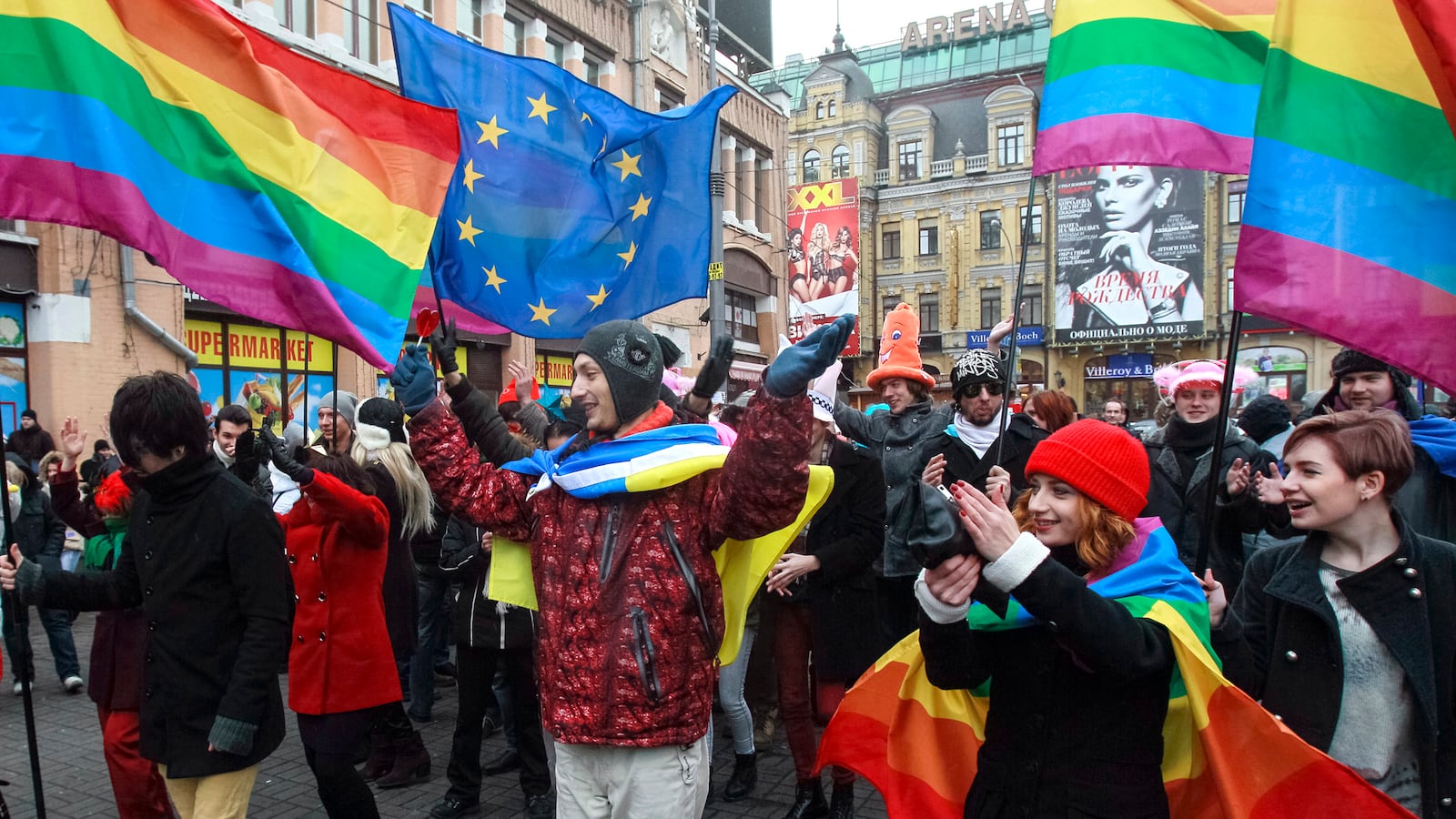Last fall, Ukrainian gay activist Bogdan Globa eagerly joined his countrymen to protest then-President Viktor Yanukovych’s last-minute refusal to sign a trade and political agreement with the European Union. Gathering in Kiev’s Independence Square, or “Maidan,” the impromptu protest quickly transformed into a movement that, months later, led to Yanukovych’s ouster. For Globa and other gay activists, the decision to join the protests was an easy one. “The revolution was about the European Union and a European lifestyle…European values include the LGBT question.”

Yet when Globa, Executive Director of the gay rights organization Fulcrum, took to the square, he and his colleagues did so without rainbow flags, or anything else that might identify them as gay activists. The decision was a purely strategic one. Homophobia is deeply ingrained in Ukrainian society; a 2013 poll found a full 80% of citizens holding negative attitudes towards homosexuality. “Maidan has many different groups,” he told me, sitting in his office kitchen, festooned with photographs of Elton John, whose AIDS foundation sponsors Fulcrum. “Some are liberal and very left but a lot of people are very right and don’t like the LGBT community and have very homophobic opinions… We went to the Maidan not as LGBT [activists] but as European Union activists.”
When the revolution succeeded in ousting Yanukovych, who fled to Russia last month, Globa and many other gays were hopeful that Ukraine would further distance itself from Moscow, where homophobia has become official state policy. But now Ukraine’s activists are facing an unanticipated obstacle in their quest—the European Union itself.
Last Monday, Ukraine’s new Justice Minister triumphantly announced that the EU had dropped a demand requiring the inclusion of sexual orientation in an anti-discrimination bill. Passage of such a law is necessary in order for Kiev to achieve a visa liberalization package with the EU, whereby Ukrainians would be able to travel freely throughout the 28-nation bloc. While the EU has publicly denied backing down on this condition, Globa says that European Commission officials told him otherwise in a meeting last week.
The fight over gay rights within Ukraine is playing out amidst a broader geopolitical struggle between Russia and the West, in which attitudes towards homosexuality are moving towards center stage. Since the Russian Duma’s unanimous passage of a law last summer banning the “propagation of non-traditional sexual relations to minors,” Russian President Vladimir Putin has articulated a vision for Russia leading an alliance of conservative nations standing athwart history yelling, “Stop.” Russia’s role on the world stage, he said, would be to “prevent movement backward and downward, into chaotic darkness and a return to a primitive state.” Painting the West as sexually decadent and depraved, and holding up Russia as a bulwark against evils such as homosexuality and pedophilia (which he conflates), is a crucial part of this propaganda offensive.
This has put Ukrainian gay activists and their allies in a bind. Committed to creating a society more accepting of homosexuality, they fear that raising the specter of gay rights, particularly at this politically sensitive moment, gives Moscow an easy propaganda hand to play.
Globa’s self-closeting during the Maidan protests was evidence of this tension. A European political consultant in Kiev, whose pro-gay bona fides are not in doubt, told me that he opposes including sexual orientation in the non-discrimination law because Moscow would cynically seize upon it to tell Ukrainians, “See, the EU really does mean homosexuality.” Now, with the new government in Kiev facing political instability at home and a potential Russian invasion, is simply not the time for talking about so highly charged and tangential an issue like gay civil rights.
Indeed, one can imagine political strategists in the Kremlin salivating at the prospect of Ukraine’s pro-Western government adopting such a measure, essentially confirming the EU as the bogeyman of Russian nightmares. (That the post-Yanukovych government is composed of gay-lovers runs counter to the other major Russian narrative—that it is composed of fascists—does not seem to cause the disseminators of Russian propaganda any cognitive dissonance.)
Last year, in the weeks running up to the summit where Yanukovych eventually scotched the Association Agreement with the EU, a pro-Russian organization with close ties to Putin put up posters declaring that “association with the EU means same-sex marriage.” The chair of the Duma’s foreign policy committee tweeted that an agreement with the EU would mean, “pride parades will be held instead of Victory Day parades” in Kiev.
In the face of such unremitting and cynical propaganda from the Russian side, it’s understandable how some pro-European forces in Ukraine, even those ostensibly committed to gay rights, would be hesitant to advance this particular cause. Yet abandoning the push for equality now would squander a rare opportunity. Given popular Ukrainian attitudes towards gays, influenced heavily by a Soviet-era ideology that deemed homosexuality a bourgeois perversion, it’s unlikely that the Ukrainian parliament would pass such a measure on its own. What is needed is pressure from an influential outside actor with strong economic and political leverage, that is, the EU.
I saw this leverage first hand several years ago, when I covered the first successful gay pride parade in Belgrade, Serbia. Some 500 pro-gay demonstrators faced down 10 times as many fascist thugs, with a heavy deployment of Serbian riot police standing between them. The government would not have expended such money and effort were it not for strong pressure from the EU, which Belgrade is desperate to join. Similarly, last October, the government of Moldova abruptly repealed an anti-gay law modeled on Russia’s when it became clear that it was standing in the way of further integration with the bloc.
After Russia’s invasion and annexation of Crimea, Ukrainian anger towards Moscow is running at an all-time high. This sense of betrayal, Globa says, renders Ukrainians much less susceptible to Russian appeals to Slavic Orthodox unity. The EU’s preemptively backing down out of fear for how Moscow will respond, he says, is “political prostitution.”
The most convincing reason to move forward on the cause of equality, however, has little to do with Russia, and everything to do with Ukraine. Dropping protections for gays in the country’s anti-discrimination law would betray a fundamental concern of the protestors who took to the Maidan last winter: that the state respect individual dignity. Of the over 100 people murdered by Yanukovych’s security forces in the final days of the revolution, one gay activist told me, three were gay. They just didn’t tell their fellow protesters about it.






